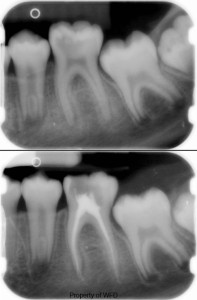What is a root canal?
Root canals aren’t as frightening as they sound. Teeth with excessive decay, fracture, or trauma may become infected, or the nerve inside the tooth may become inflamed so that removing the nerve is the only way to remove the pain without removing the entire tooth. A tooth that becomes very sensitive or painful to hot or cold, or a tooth that begins to hurt spontaneously on its own may need root canal therapy. Sometimes a tooth can be infected and require a root canal even if it does not hurt; this most commonly occurs when the nerve of the tooth dies, often from physical trauma. Without root canal therapy, bacteria can persist and spread in the bone around infected teeth and cause issues with dental or overall health.
Different teeth have different numbers of roots, and each root may have more than one canal. Some teeth only have one root and one canal, while certain back teeth can have as many as four roots and five canals (or more!).

Bottom: X-ray immediately after RCT has filled the tooth.
How is root canal therapy done?
A careful examination with an x-ray, followed by some specific testing, can help determine the status of a tooth and whether or not it requires root canal therapy. Local anesthetic is used to numb the area around the tooth. Any decay is removed, and the nerve of the tooth is removed via sequentially-sized files. The root(s) of the tooth are rinsed and filled with a rubber-like material, followed by a build-up material for the top part of the tooth (this may be done at a separate visit). A post may be needed to help retain the build-up material in the tooth. Most teeth will need crowns after the root canal is completed to prevent fractures or leakage, but in some cases a large filling may be placed instead.
What are the risks of root canals?
At your appointment we’ll go over all the risks, but root canals are generally successful at producing a pain-free tooth in most cases. As with any surgical procedure there are things that can be unpredictable. Every tooth’s anatomy is different, and all cracked teeth and cavities are different, so sometimes referral to a root canal specialist (endodontist) is necessary.
If you have more questions or concerns, contact the office today at 318-869-2535.
